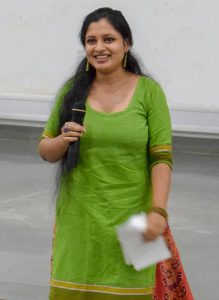
My doctoral research focuses upon the analysis of the testimonies and oral narratives collected from the 2nd and 3rd generation 1947 partition migrants whose previous generation crossed the borders of West Bengal in India and East Pakistan (now Bangladesh). The study attempts to understand how the history of the 1947 forced migration is perceived, starting from what is meant by the ‘past’ and ‘present’ and how we understand the transformation from the ‘past’ to the ‘present’. If the identity formation of the contemporary generation is dictated by the history of the migration and an event in the past defines who they are today, the language and the narratives they use to construct the testimonies also gets dictated by the overarching historical perspective that defines the present partition subjects. The role of memory and how memory gets passed on to the next generation through different mediums like language, cultural practices, traditions of storytelling and oral narratives play a key role in how the history or the past is perceived. The research looks into the linguistic strategies of healing, reclamation and negotiation in the 2nd and 3rd generation partition migrants and how they imbibe the traumatic experiences of the migration. I aim to understand how the contemporary partitioned subjects make meaning of their lives through their histories and memories of migrations, trauma and recreating their identities.
I grew up in an East Bengal refugee colony in New Delhi, India. The stories of the Partition migrants have been an innate part of my life. Due to my interest in narratives and traditions of story-telling, I did my undergraduate degree in B.A. (Hons.) Humanities and Social Sciences, with a Major in English Literature from Cluster Innovation Centre, University of Delhi. I completed my Master’s degree in Society and Culture (Post-colonial Literature and Partition Studies) from the Department of Humanities and Social Sciences at Indian Institute of Technology, Gandhinagar, where I studied the literary representation of women in several short stories and how they responded and reacted to the social turmoil of both the pre-partition years and after the India-East Pakistan border-line was drawn in 1947. I am a trained Oral Historian with the 1947 Partition Archive, California, and have collected over 25 actual oral accounts of the migrants who witnessed the 1947 India-Pakistan Partition. I have also worked with Katha Publication rewriting, designing and translating folk-stories for young children and incorporating them in the mainstream curriculum of the schools.
E-mail: rituparna.rana (at) fu-berlin.de
Conference Presentations
Rituparna Rana. “The ‘Postmemory’ of 2nd and 3rd Generation Partition Migrants: Oral Narratives as an Alternative History of the 1947 Partition of India.” The Annual South Asia Graduate Student Conference, The University of Chicago, Chicago, USA, 5-7 March, 2020.
Rituparna Rana. “Women’s Body – Legitimacy & Violence: Reading the 1947 Partition trauma through literary representation.” American Comparative Literature Association Annual Conference – Configuring Trauma and Ideology Representation, Chicago, USA, March 19-21, 2020.
Rituparna Rana. “Oral Narratives of 1947 Partition of India: Linguistic Strategies of Healing and Negotiation with Trauma.” IMISCOE PhD Network Presentation Series 2021, 1 June, 2021.
Other Publications, Lectures, and Interviews
Rituparna Rana. “The importance of oral narratives in recording and archiving the histories of the 1947 Partition migration.” Guest lecture at the University of Minnesota, Minneapolis, USA 10-15 March, 2020.






